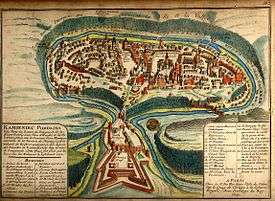Podolia Eyalet
| Eyalet-i Kamaniçe | |||||
| Eyalet of the Ottoman Empire | |||||
| |||||
.svg.png) | |||||
| Capital | Kamianets-Podilskyi 48°41′N 26°35′E / 48.683°N 26.583°ECoordinates: 48°41′N 26°35′E / 48.683°N 26.583°E | ||||
| History | |||||
| • | Siege of Kamenets | 1672 | |||
| • | Treaty of Karlowitz | 1699 | |||
| Today part of | | ||||
Podolia Eyalet (Ottoman Turkish: Eyalet-i Kamaniçe)[1] was an eyalet of the Ottoman Empire. Its capital was Kamianets-Podilskyi (Polish: Kamieniec Podolski; Ukrainian: Кам’янець-Подільський; Turkish: Kamaniçe;).
History
In 1672 the Ottoman army, led by Sultan Mehmed IV, captured Kamaniçe after a short siege.[2] The Treaty of Buchach confirmed Ottoman control of the city, which became the centre of a new eyalet.[2] The treaty was repudiated by the Polish Diet, and war broke out anew.[2]
The Polish campaign proved unsuccessful, and the truce of Żurawno (1676) left Podolia within Ottoman borders. Another Polish-Ottoman war broke out again in 1683.[2] For the next 16 years, Ottoman rule in Podolia generally was limited to the blockaded fortress of Kamianets, held by a garrison of 6,000 soldiers.[2] The other garrisons in Podolia, in Bar, Medzhybizh, Jazlivec, and Chortkiv, barely exceeded 100 soldiers each.[3]
According to the Ottoman provincial budget of 1681, 13 million akçe were spent yearly in the eyalet, primarily for soldiers' pay. Of this amount, less than 3% was collected from Podolia itself, the rest was sent from the central treasury.[3] In 1681, the patriarch of Constantinople appointed the Orthodox metropolitan of Kamianets, named Pankratij.[4]
The fortress was returned to Poland as a result of the Treaty of Karlowitz (1699).[2]
Governors

During the 27 years of Ottoman rule, Podolia was administered by nine Ottoman pashas:[2]
- Küstendilli Halil (1672–76; 1677–80),
- Arnavut Ibrahim (1676–77)
- Defterdar Ahmed (1680–82)
- Arnavut Abdurrahman (1682–84)
- Tokatlı Mahmud (1684)
- Bozoklu Mustafa (1685–86)
- Sarı Boşnak Hüseyin (1686–88)
- Yegen Ahmed (1688–89)
- Kahraman Mustafa (1689–99)
Administrative divisions
The eyalet was divided into four sanjaks:[2]
References
- ↑ Marc David Baer (2011-09-01). Honored by the Glory of Islam: Conversion and Conquest in Ottoman Europe. Oxford University Press. p. 290. ISBN 978-0-19-979783-7. Retrieved 2013-06-03.
- 1 2 3 4 5 6 7 8 Agoston, Gabor; Masters, Bruce Alan (2009). Encyclopedia of the Ottoman Empire. Infobase Publishing. p. 306. ISBN 978-1-4381-1025-7. Retrieved 2013-02-25.
- 1 2 Kołodziejczyk, Dariusz (June 1992). "Ottoman Podillja: The Eyalet of Kamjanec', 1672-1699". Harvard Ukrainian Studies. 16 (1/2): 87–101. JSTOR 41036452.
- ↑ Kołodziejczyk, Dariusz (2006). "The "Turkish Yoke" Revisited: The Ottoman Non-Muslim Subjects Between Loyalty, Alienation, And Riot" (PDF). Acta Poloniae Historica (93): 178–195. ISSN 0001-6829.
